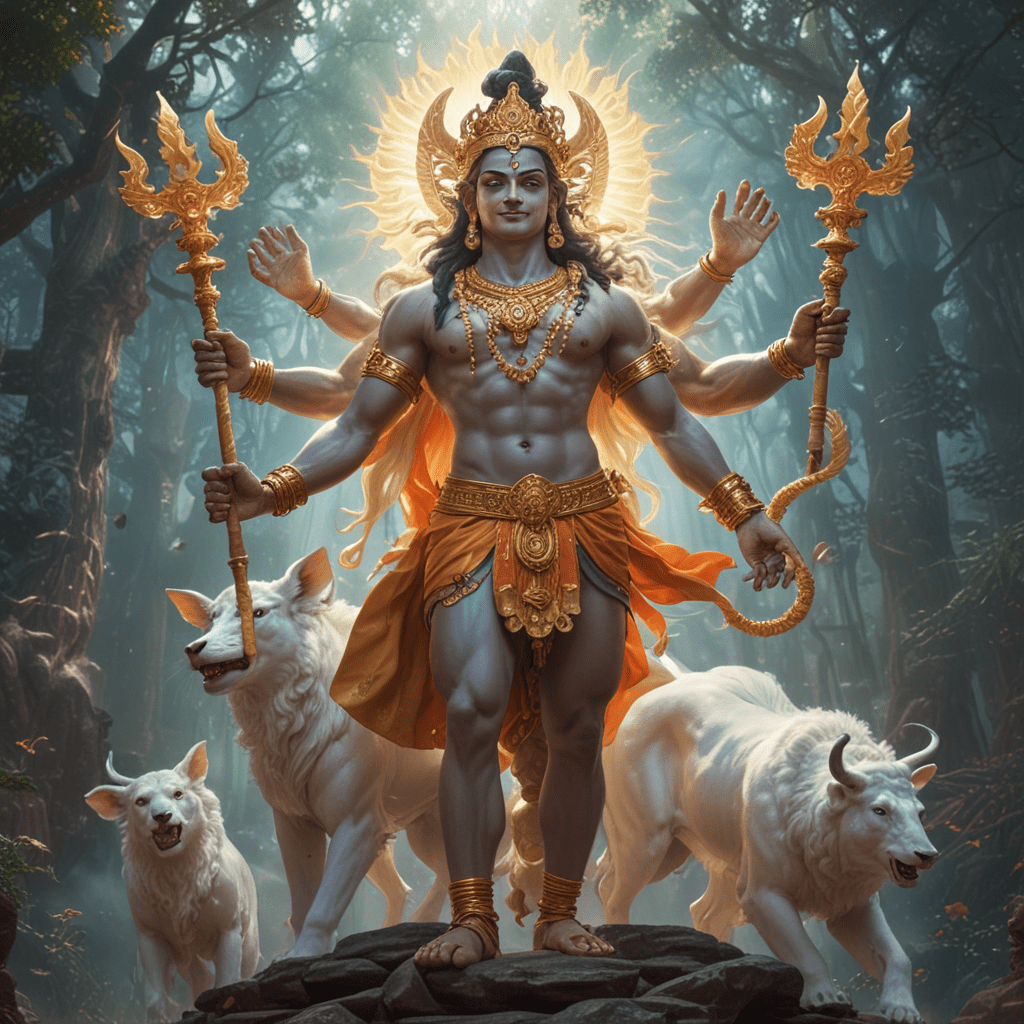Fate and Destiny in Thai Mythology
Introduction: The Role of Destiny in Thai Culture
Thai culture is deeply intertwined with the belief in fate, or destiny, which plays a significant role in shaping people's lives and understanding of the world. This concept, rooted in ancient traditions and influenced by Hinduism and Buddhism, permeates Thai mythology, literature, and daily life. The idea of fate, often referred to as "กรรม" (karma) in Thai, is a powerful force that guides individuals and influences their experiences, both good and bad. It's a belief that individuals are not entirely in control of their destinies, but are guided by a predetermined path.
1. The Cycle of Rebirth and Karma: A Fundamental Belief
A core belief in Thai mythology is the concept of reincarnation, or the cycle of birth, death, and rebirth. According to this belief, individuals are continually reborn into new lives, their destinies shaped by the actions and consequences of their past lives. The principle of karma, the law of cause and effect, influences this cycle of rebirth. Good deeds, or "bun," lead to favorable outcomes in the present and future lives, while negative actions, or "baap," result in suffering and hardship. This belief in karma and rebirth underscores the importance of living a virtuous and ethical life, as it directly affects one's future destiny.
2. The Influence of Hinduism and Buddhism
Thai mythology has been significantly shaped by the influence of Hinduism and Buddhism, both of which emphasize the role of fate. Hinduism, with its concept of "karma" and "dharma," introduced the notion of a cosmic order and the interconnectedness of all beings. Buddhism, with its emphasis on the impermanence of life and the pursuit of enlightenment, further reinforced the idea that suffering and happiness are determined by actions and karma. These influences have woven a complex tapestry of beliefs surrounding fate, reincarnation, and the pursuit of spiritual liberation in Thai culture.
3. The Three Destinies: Past, Present, and Future
In Thai mythology, fate is often visualized as a combination of three intertwined destinies: the past, the present, and the future. The past, shaped by one's karma, influences the present life. The present, in turn, creates new karma that affects the future. This cyclical nature of fate emphasizes the interconnectedness of all actions and their consequences.
4. The Role of Gods and Spirits in Shaping Fate
Gods and spirits also play a significant role in shaping fate within Thai mythology. Each deity has a specific domain and is believed to influence different aspects of life, including love, wealth, luck, and protection. These deities can be petitioned for guidance, blessings, or intervention in matters concerning one's fate.
5. The Concept of “Karma” and its Impact on Destiny
The concept of "karma" is central to the understanding of fate in Thai mythology. It represents the cumulative effect of one's actions, both good and bad, across multiple lifetimes. Good karma, or "bun," brings positive outcomes, while negative karma, or "baap," leads to suffering. Karma is a constant reminder that individuals are responsible for their actions and their consequences, shaping their destinies through the choices they make.
6. Fate vs. Free Will: A Balancing Act
While fate plays a significant role in Thai mythology, the concept of free will is also acknowledged. The belief in karma and the cycle of rebirth doesn't imply a complete lack of agency. Individuals are still seen as having a degree of control over their lives and their destinies. They can make choices that influence their karma and ultimately shape their future. This balancing act between fate and free will is a complex and nuanced aspect of Thai mythology.
Thai proverbs and sayings often reflect this duality. For example, "Chai Daeng Di Kwai Daeng (Even a red rooster can be born from a red cow)" points to the possibility of defying fate. While the proverb acknowledges the power of destiny, it also suggests that with effort and determination, one can overcome limitations and create their own path.
7. The Influence of Astrology and Divination
Astrology and divination play a significant role in shaping the perception of fate in Thai society. Many Thais believe that their star signs, or "raashi", influence their personalities, relationships, and life paths. Astrologers are consulted for guidance on important life decisions, such as marriage, business ventures, and travel.
Divination practices, like fortune-telling and palm reading, are also widely practiced. These practices are believed to provide insights into one's fate and offer guidance on navigating life's challenges. While these practices don't directly predict the future, they are seen as tools for understanding the influences shaping one's destiny and making informed decisions.
8. Examples of Fate in Thai Mythology and Literature
Numerous myths and stories in Thai mythology illustrate the concept of fate. One famous tale is the story of "Phra Apai Mani," a prince who is destined to become a king. However, his journey to fulfill his destiny is filled with obstacles and challenges, highlighting the power of fate and the importance of perseverance.
Another example is the story of "Suwanna Hong," a princess who is destined to marry a powerful king. However, she falls in love with a humble fisherman, defying her predetermined fate and challenging societal expectations. These stories, and many others, showcase the complexities of fate, the power of choice, and the constant tension between destiny and free will in Thai mythology.
9. Modern Interpretations and Perceptions of Fate in Thai Society
In modern Thai society, the concept of fate continues to be influential, but interpretations have evolved. While traditional beliefs persist, particularly in rural areas, urban dwellers often embrace a more nuanced view. They acknowledge the influence of destiny, yet emphasize the importance of personal effort and responsibility. Many Thais believe that while fate may set certain limitations, individuals have the power to make choices that shape their destinies.
10. Conclusion: Fate as a Guiding Principle in Thai Life
The belief in fate permeates Thai mythology and culture, serving as a guiding principle in daily life. It provides a framework for understanding the complexities of life, accepting both good and bad fortune, and finding meaning in both joys and sorrows. While it may influence choices and actions, it also encourages individuals to strive for a virtuous life, contributing to a better future for themselves and the world around them.
FAQ:
1. Is it true that everyone has a predetermined destiny in Thai mythology?
While Thai mythology acknowledges the power of destiny, it's not necessarily a rigid concept. It emphasizes the impact of karma and the choices individuals make. Therefore, while some aspects of one's life may be predetermined, individuals still have agency in shaping their future.
2. How do the beliefs in fate and free will coexist in Thai culture?
This is a complex topic. Some might believe that fate is a guiding force, while others might emphasize the importance of free will and making choices in life. Ultimately, it's a matter of individual interpretation and perspective.
3. How does fate affect everyday life in Thailand?
The belief in fate can influence various aspects of everyday life, from career choices and relationships to navigating challenges and seeking guidance. It encourages a sense of acceptance and responsibility for actions while seeking balance between individual agency and the power of destiny.



